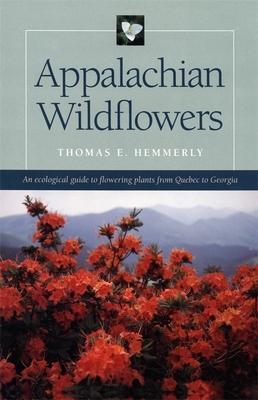This informative field guide covers the wildflowers of the entire Appalachian region, which stretches from Quebec to northern Alabama, encompassing the Catskills of New York, the Berkshires of Massachusetts, the Blue Ridge Mountains of Virginia, North Carolina, and Tennessee, and many mountain ranges in between. Using this book, readers will learn to identify this region's wildflowers by shape, color, family, and habitat.
Ecologist and botanist Thomas E. Hemmerly encourages us to "read the landscape" in order to learn about plants' habitats, distribution, and use. In his brief, introductory chapters, he describes ecosystems such as mountain forests and wetlands to provide a context for the information on individual plant species that will be valuable to both professional scientists and amateur naturalists. Practical: The 378 color plates, grouped by color for clear reference, appear alongside plant descriptions for ease of identification.Informative: Each entry includes a description of the plant's habitat, abundance, and geographical distribution, along with information about its ethnobotanical, economic, or medicinal uses. An appendix lists and describes the best places in the Appalachians for "botanizing."User-Friendly: Diagrams of leaf and flower shapes are a further aide to plant identification.The Appalachian Region: Alabama, Connecticut, Georgia, Kentucky, Massachusetts, New Hampshire, New York, North Carolina, Pennsylvania, Quebec, South Carolina, Tennessee, Vermont, Virginia, West Virginia
This informative field guide covers the wildflowers of the entire Appalachian region, which stretches from Quebec to northern Alabama, encompassing the Catskills of New York, the Berkshires of Massachusetts, the Blue Ridge Mountains of Virginia, North Carolina, and Tennessee, and many mountain ranges in between. Using this book, readers will learn to identify this region's wildflowers by shape, color, family, and habitat.
Ecologist and botanist Thomas E. Hemmerly encourages us to "read the landscape" in order to learn about plants' habitats, distribution, and use. In his brief, introductory chapters, he describes ecosystems such as mountain forests and wetlands to provide a context for the information on individual plant species that will be valuable to both professional scientists and amateur naturalists. Practical: The 378 color plates, grouped by color for clear reference, appear alongside plant descriptions for ease of identification.Informative: Each entry includes a description of the plant's habitat, abundance, and geographical distribution, along with information about its ethnobotanical, economic, or medicinal uses. An appendix lists and describes the best places in the Appalachians for "botanizing."User-Friendly: Diagrams of leaf and flower shapes are a further aide to plant identification.The Appalachian Region: Alabama, Connecticut, Georgia, Kentucky, Massachusetts, New Hampshire, New York, North Carolina, Pennsylvania, Quebec, South Carolina, Tennessee, Vermont, Virginia, West VirginiaPaperback
$30.95